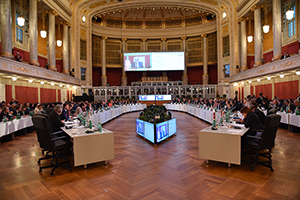 Monday, April 8, 2019, Vienna, Austria
Monday, April 8, 2019, Vienna, Austria
Address of the President of the Assembly of the Republic of North Macedonia at the Conference of Speakers of the European Union Parliaments on the topic „The European Union and its neighbours“
Distinguished Chairman,
Dear colleagues,
Ladies and gentlemen,
The topic we are debating on today, the European Union and its neighbours, is of special importance to us, candidate countries for full membership, since it reaffirms the open door policy for the countries of the Western Balkan region. This is even more important because this is the election year for the European Parliament, which is the foundation of democratic life, not only within the European Union but the whole continent too. I believe that at the elections in May, the principles the European Union rests upon will triumph, and those principles are human rights and freedoms, the legal state and rule of law, peace and security as indivisible categories, and certainly, solidarity.
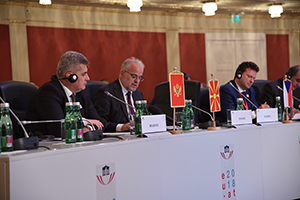 I believe you are all aware that the Republic of North Macedonia, in the past couple of years, has indeed made historic steps which have put us back on the Euro-Atlantic track. Clearly, I am referring to the Prespa Agreement, with which the almost three decade long dispute with neighbouring Greece was overcome. This has not only unblocked our path to the European Union and NATO membership, but has enabled Skopje and Athens to give a strong impetus to peace, stability and, of course, to cooperation in the region and its European future. Please note that at the beginning of this month, a government delegation of neighbouring Greece, headed by Prime Minister Tsipras and accompanied by a large number of Greek businessmen, stayed in Skopje. I am referring to all of this as a good example, in the sense that, when there is will and courage to respect and implement the European principles and standards, then it is possible to find a solution to any problem or open issue.
I believe you are all aware that the Republic of North Macedonia, in the past couple of years, has indeed made historic steps which have put us back on the Euro-Atlantic track. Clearly, I am referring to the Prespa Agreement, with which the almost three decade long dispute with neighbouring Greece was overcome. This has not only unblocked our path to the European Union and NATO membership, but has enabled Skopje and Athens to give a strong impetus to peace, stability and, of course, to cooperation in the region and its European future. Please note that at the beginning of this month, a government delegation of neighbouring Greece, headed by Prime Minister Tsipras and accompanied by a large number of Greek businessmen, stayed in Skopje. I am referring to all of this as a good example, in the sense that, when there is will and courage to respect and implement the European principles and standards, then it is possible to find a solution to any problem or open issue.
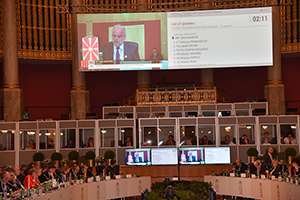 I would like to add that, previously, we signed the Treaty of Friendship with neighbouring Bulgaria too, thus overcoming certain historical antagonisms which had hampered our bilateral relations. You know, we in the region of the Western Balkans were famous for continuously creating history which we couldn’t consume nor could we learn from. Therefore, historical mistakes recurred and the price paid was too high. However, I believe we have overcome these things. Even though there are still open issues in the region, such as the relations between Belgrade and Prishtina, it is a fact that, all of us in the region have accepted that open issues and problems can only be resolved through dialogue. And we may all agree that, peace and stability in Europe depends on peace and stability in the Western Balkans.
I would like to add that, previously, we signed the Treaty of Friendship with neighbouring Bulgaria too, thus overcoming certain historical antagonisms which had hampered our bilateral relations. You know, we in the region of the Western Balkans were famous for continuously creating history which we couldn’t consume nor could we learn from. Therefore, historical mistakes recurred and the price paid was too high. However, I believe we have overcome these things. Even though there are still open issues in the region, such as the relations between Belgrade and Prishtina, it is a fact that, all of us in the region have accepted that open issues and problems can only be resolved through dialogue. And we may all agree that, peace and stability in Europe depends on peace and stability in the Western Balkans.
Ladies and gentlemen,
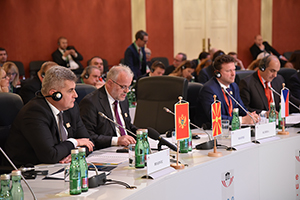 Certainly, when we talk about good-neighbourly policy and its development, we must emphasize regional cooperation which embodies both EU member states, and candidate countries for membership. One such form of successful cooperation is the Adriatic – Ionian initiative, which had a very successful meeting in Budva, Montenegro, a while ago. At the meeting we discussed two significant topics, cooperation in the field of tourism and cooperation between various parliamentary bodies. There are more important aspects to these types of regional cooperation. On the one hand, the open door policy for membership in the European Union is demonstrated in practice, and this is very important to us, aspirant countries, and, on the other hand, it strengthens the cohesive ties, both at the regional level and beyond. Through regional cooperation, we, the candidate countries for membership in the European Union, can more effectively benefit from the experiences of the member states, especially with regard to the necessary social and economic reforms. A highly developed democratic society, a functioning legal state and a developed economy are a benefit for the countries in the region, but also a benefit for the entire European Union.
Certainly, when we talk about good-neighbourly policy and its development, we must emphasize regional cooperation which embodies both EU member states, and candidate countries for membership. One such form of successful cooperation is the Adriatic – Ionian initiative, which had a very successful meeting in Budva, Montenegro, a while ago. At the meeting we discussed two significant topics, cooperation in the field of tourism and cooperation between various parliamentary bodies. There are more important aspects to these types of regional cooperation. On the one hand, the open door policy for membership in the European Union is demonstrated in practice, and this is very important to us, aspirant countries, and, on the other hand, it strengthens the cohesive ties, both at the regional level and beyond. Through regional cooperation, we, the candidate countries for membership in the European Union, can more effectively benefit from the experiences of the member states, especially with regard to the necessary social and economic reforms. A highly developed democratic society, a functioning legal state and a developed economy are a benefit for the countries in the region, but also a benefit for the entire European Union.
Dear colleagues,
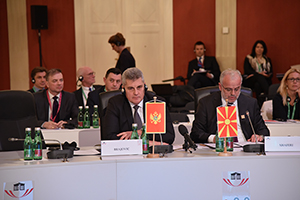 As I have already stressed, the Western Balkan region is not the same as it was a year or two ago. Brussels’ policy toward the region as a whole and each country individually has also contributed to these positive steps and outcomes. This policy, on the one hand, clearly shows that Brussels wants to integrate the region, and at the same time, it very transparently indicates what each country should do to fulfill the so-called "Copenhagen criteria" in order to become a full member. This year, when elections are to be held within the European Union, and the processes related to Brexit are in the spotlight too, it is expected that Brussels will devote much more attention to these issues, that is, they will be in the front line. In such a political reality, the good-neighbourly policy that manifests itself best through the accession process to the European Union, and the validation of the progress of each country individually, must continue. In this way, public support and mobilization is strengthened for the pro-European course in the candidate countries, while at the same time, our responsibility as politicians to continue with the necessary reforms is increased. Let's not forget that the Western Balkans is culturally and civilizationally part of Europe, and in this context we have a saying "it is nice when it is whole".
As I have already stressed, the Western Balkan region is not the same as it was a year or two ago. Brussels’ policy toward the region as a whole and each country individually has also contributed to these positive steps and outcomes. This policy, on the one hand, clearly shows that Brussels wants to integrate the region, and at the same time, it very transparently indicates what each country should do to fulfill the so-called "Copenhagen criteria" in order to become a full member. This year, when elections are to be held within the European Union, and the processes related to Brexit are in the spotlight too, it is expected that Brussels will devote much more attention to these issues, that is, they will be in the front line. In such a political reality, the good-neighbourly policy that manifests itself best through the accession process to the European Union, and the validation of the progress of each country individually, must continue. In this way, public support and mobilization is strengthened for the pro-European course in the candidate countries, while at the same time, our responsibility as politicians to continue with the necessary reforms is increased. Let's not forget that the Western Balkans is culturally and civilizationally part of Europe, and in this context we have a saying "it is nice when it is whole".
Thank you for your attention!